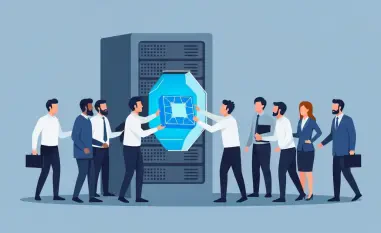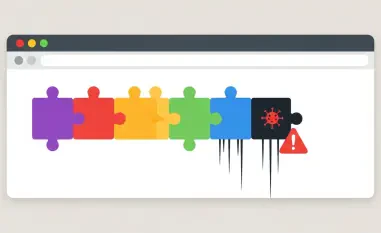The governance, risk, and compliance (GRC) market has witnessed remarkable growth, fueled by evolving regulatory frameworks and advancements in technology. Businesses now recognize the necessity of robust GRC strategies as they navigate a complex threat landscape and stringent regulations. The adoption of these strategies has become integral to organizations’ digital transformation efforts, ensuring they remain resilient and compliant in the face of an ever-changing environment.
Evolving Regulatory Landscape
Increasingly Stringent Regulations
The rapid expansion of the GRC market is closely tied to the introduction of more stringent regulatory frameworks such as the General Data Protection Regulation (GDPR), Network and Information Systems (NIS2) Directive, and the Digital Operational Resilience Act (DORA). These regulations mandate that businesses bolster their compliance frameworks to avoid substantial penalties. For instance, this year alone, businesses have faced GDPR compliance fines exceeding €5 billion (£4.18 billion), highlighting the severe financial consequences of non-compliance. Such figures underscore the urgency for companies to invest in comprehensive GRC solutions that ensure adherence to these regulations.
This trend is not isolated to Europe; regulatory bodies globally are enacting similar measures to protect sensitive data and ensure operational resilience. As a result, organizations must continuously update and refine their compliance strategies to meet the demands of an ever-evolving regulatory landscape. The increased complexity of these regulations drives the need for more sophisticated compliance processes and solutions, making the role of GRC platforms more critical than ever. Businesses that fail to keep pace with these changes risk significant financial penalties and reputational damage, further emphasizing the importance of robust GRC initiatives.
Impact of Cybersecurity and Data Protection Breaches
Cybersecurity and data protection breaches pose significant challenges for organizations, disrupting business operations and attracting stringent enforcement actions from regulatory authorities. The current threat landscape is complex and rapidly evolving, necessitating comprehensive GRC solutions to effectively mitigate risks and ensure compliance. Organizations must prioritize their compliance strategies to safeguard against potential breaches and the resulting regulatory penalties.
In the wake of high-profile cybersecurity incidents, regulators have intensified their scrutiny, enforcing strict penalties on non-compliant organizations. This has led to a heightened awareness among businesses regarding the critical importance of robust compliance mechanisms. A proactive approach to GRC not only helps organizations avoid costly fines but also enhances their ability to respond to and recover from cyber incidents. As data breaches continue to make headlines, the demand for advanced GRC solutions that can address these challenges is only expected to grow. By investing in such solutions, businesses can better protect their assets, maintain operational continuity, and build trust with stakeholders.
Technological Advancements in GRC Solutions
Integration of AI and Automation Technologies
The integration of artificial intelligence (AI) and automation technologies into GRC solutions is a key driver of market growth. These technologies significantly enhance the efficiency and effectiveness of compliance processes, enabling businesses to manage risk assessments, policies, and audits more adeptly. AI-driven tools facilitate the identification of compliance risks related to data privacy and transparency, helping organizations stay ahead of potential issues.
Advanced AI algorithms can analyze vast amounts of data at unprecedented speeds, providing insights that were previously unattainable. This capability allows organizations to detect patterns and anomalies that may indicate compliance breaches or vulnerabilities. Automated workflows further streamline the compliance process, reducing the burden on human resources and minimizing the potential for error. As a result, businesses can ensure more consistent and reliable compliance management, ultimately leading to a more resilient operational structure. The adoption of AI and automation in GRC is not just a trend but a critical evolution that empowers organizations to maintain compliance in an increasingly complex regulatory environment.
Centralized Compliance Platforms
Centralized compliance platforms play an essential role in the GRC market by offering continuous monitoring and reporting services across various business functions. These platforms integrate data from systems such as cybersecurity, IT service management (ITSM), and enterprise resource planning (ERP) tools, providing a unified view of performance and potential vulnerabilities. Automated compliance workflows further streamline risk management and audit readiness, enabling organizations to efficiently manage their compliance efforts.
By aggregating data from multiple sources, centralized compliance platforms offer a comprehensive view of an organization’s compliance status. This holistic approach allows for real-time monitoring and swift identification of potential issues, facilitating prompt corrective actions. Moreover, these platforms can generate detailed reports that support internal audits and regulatory inspections, ensuring that organizations are always prepared for scrutiny. The ability to automate routine compliance tasks also frees up valuable resources, allowing teams to focus on strategic initiatives that drive business growth. As businesses continue to face increasing regulatory pressures, the demand for centralized compliance platforms is expected to rise, solidifying their importance in the GRC landscape.
Opportunities for Channel Partners
Building Service and Product Portfolios
For resellers, managed service providers (MSPs), and system integrators (SIs), the expanding GRC market presents a significant opportunity to develop service and product portfolios centered around essential compliance frameworks. Their expertise enables them to engage customers in meaningful discussions about enhancing GRC efforts and preparing for regulatory changes. By offering tailored solutions, channel partners can help businesses navigate the complexities of compliance while adding value to their services.
The growing importance of compliance in business operations means that organizations are increasingly seeking expert guidance from channel partners. These partners can leverage their knowledge to design and implement GRC strategies that align with specific industry requirements and regulatory mandates. Additionally, by staying abreast of the latest regulatory developments, channel partners can provide timely advice and solutions that help businesses maintain compliance. The ability to offer comprehensive, sector-specific GRC solutions not only sets channel partners apart from their competitors but also fosters long-term relationships with clients, driving sustained growth and profitability.
Customizing Vendor Solutions
Channel partners with the ability to customize vendor solutions to meet sector-specific or regional requirements are in high demand. For instance, following Brexit, UK organizations trading within the EU must navigate various compliance requirements and design their processes accordingly. These businesses often require expert guidance from channel specialists to meet their obligations and ensure seamless operations. Channel partners who can tailor solutions to address unique compliance challenges are well-positioned to capitalize on this demand.
Customization is crucial in the GRC space, as different industries and regions have specific regulatory requirements and operational challenges. By offering customized solutions, channel partners can address the unique needs of their clients, providing them with the tools and support necessary to achieve compliance. This level of personalization not only enhances the effectiveness of GRC solutions but also builds trust and credibility with clients. As a result, businesses are more likely to rely on channel partners for ongoing compliance support, creating opportunities for long-term collaboration and growth. The ability to deliver tailored GRC solutions will continue to be a key differentiator for channel partners in the competitive market landscape.
Future Growth and Complexity
Increasing Demand for Compliance Solutions
As the demand for compliance solutions continues to grow, the number of channel partners being onboarded is also increasing. This trend is expected to persist as organizations prioritize their compliance strategies, focusing investments, and collaborating with service providers who can meet their needs. Leaders in AI and automation have a significant opportunity to guide channel partners in offering risk-aware compliance approaches through advanced technologies.
The increasing complexity of regulatory frameworks necessitates a proactive approach to compliance, prompting businesses to seek out reliable partners who can provide the necessary expertise and support. Channel partners that can demonstrate their ability to navigate the intricacies of modern compliance requirements will be well-positioned to attract and retain clients. Additionally, by leveraging AI and automation technologies, these partners can offer innovative solutions that enhance the efficiency and effectiveness of compliance efforts. The ongoing evolution of regulatory landscapes underscores the importance of staying ahead of compliance demands, creating ample opportunities for channel partners to expand their service offerings and drive growth in the GRC market.
Anticipated Regulatory Complexity
The governance, risk, and compliance (GRC) market has seen impressive growth, driven by evolving regulatory frameworks and significant advancements in technology. Today’s businesses recognize the need for robust GRC strategies to effectively navigate a complex threat landscape and adhere to stringent regulations. These strategies have become essential components of organizations’ digital transformation initiatives, ensuring they maintain resilience and compliance in an ever-changing environment.
As regulatory requirements become more intricate, the integration of advanced technologies like AI and machine learning has become crucial. These technologies help businesses automate compliance processes, manage risks more effectively, and stay ahead of regulatory changes. Additionally, adopting a comprehensive GRC approach enables companies to build stronger governance structures, improve risk management, and enhance overall corporate performance.
Organizations that embrace these strategies are better positioned to protect their reputations, avoid costly penalties, and gain a competitive edge. As the GRC market continues to evolve, its role in securing business sustainability and growth remains undeniably significant.













